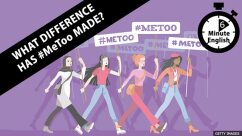BBC LEARNING ENGLISH
6 Minute English
Going through the menopause
Sam
Hello This is 6 Minute English from BBC Learning English I’m Sam
Georgina
And I’m Georgina
Sam
Something that affects almost every woman at some point in her life is the
menopause The menopause is a natural part of ageing that happens as a
woman‘s hormones decline and she stops having monthly periods and being able
to get pregnant naturally
Georgina
With the menopause comes physical signs These vary from person to person and
often include hot flushes, mood swings and night sweats But besides these there
may be other changes too and living through it can be isolating, both personally
and professionally
Sam
In many societies the menopause is still taboo – not talked about in public for
social or religious reasons, or because people are uncomfortable discussing it
Georgina
But recently high-profile women like former First Lady, Michelle Obama, have
started speaking up In this programme, we’ll be hearing from two other women
trying to make the menopause more visible in society…
Sam
…and, of course, we’ll be learning some related vocabulary as well But first let
me ask you my quiz question, Georgina As we mentioned, the menopause is part
of the natural ageing process and usually occurs between the ages of 45 and 55
But what is the average age for a woman to reach the menopause in Britain? Is it:
a) 49?
b) 51? or
c) 53?
Georgina
I’ll jump in the middle and say 51 years old
Sam
OK, Georgina, we’ll find out the answer later in the programme
Georgina
Since the menopause is a normal and natural part of life it’s surprising how little
it’s talked about Dr Nighat Arif is a British Pakistani family doctor specialising in
women’s health According to her, the silence around the subject is because
menopause is about getting old, something no one wants to be reminded of
Sam
Here is Dr Arif explaining more to BBC World Service programme, The
Conversation:
Dr Nighat Arif
Historically, particularly when it comes to women, the older you are you’re
surplus to excess now, that’s it, you’ve done your dues, you’ve had your children,
your use isn’t needed anymore in society… but actually women are not like that
at all, women are far more becoming productive in the career and workspace and
they are the caregivers, sometimes they are actually the financial providers in
their home setting as well
Georgina
In many cultures, the traditional role of women is to have children Dr Arif says
that after doing this, women may be considered to have done - or paid - their
dues – an expression meaning to do everything you are expected to do, or to
have done your duty
Sam
After raising children, women are sometimes thought to be surplus to excess,
something which is more than needed, or in other words, surplus to
requirements – a phrase meaning ‘no longer required’
Georgina
Of course, this isn’t true for all women everywhere, but it is surprising how
unequal men and women’s experience of getting older can be Barbara Hannah
Grufferman, is an American writer who publishes a regular newsletter, ‘The
Menopause Cheat Sheet’, which focuses on healthy ageing
Sam
Here she is speaking with BBC World Service Programme, The Conversation:
Barbara Hannah Grufferman
One of the biggest complications, I think, is ageism So, if women are entering
that age range, 45 and over, they’re already possibly feeling the effects of
ageism, you know, pointing in their direction And then when they add on this
layer of having physical symptoms that can impact how they’re functioning at
work and even at home - it’s a double whammy
Sam
For Barbara Hannah Grufferman, one of the biggest barriers women face is
ageism - the unfair treatment of older people because of their age
Georgina
Just as racism and sexism discriminate against people because of their race or
gender, ageism values older people less than the young
Sam
As we mentioned before, the menopause brings physical signs such as hot
flushes or night sweats These signs are known as symptoms - things wrong with
your body or mind that are signs of some illness or bodily process
Georgina
So menopausal women suffer physical symptoms, as well as possibly dealing
with discrimination based on their age Barbara Hannah Grufferman calls this a
double whammy – an informal way to describe a situation where two unpleasant
things happen at the same time
Sam
The menopause can be a difficult time in a woman’s life But with age comes
wisdom and experience and in more and more societies around the world the
menopause is being talked about more openly
Georgina
Speaking of which, what was the answer to your question, Sam?
Sam
In my quiz question I asked about the average age for British women to reach
menopause
Georgina
I said it was c) 51
Sam
Which was… the correct answer! Although for some women menopause can start
as early as in their 40s
Georgina
OK, let’s recap the vocabulary from this programme starting with taboo –
something which is forbidden for social or religious reasons
Sam
To pay your dues means to do your duty
Georgina
Surplus to requirements means to be no longer needed
Sam
Ageism is the unfair treatment of older people because of their age
Georgina
Symptom is a sign of illness
Sam
And finally, a double whammy is a situation where two unpleasant things happen
at once
Georgina
That’s all from us, but we hope to see you again soon Bye for now!
Sam
Goodbye!
VOCABULARY
taboo
custom to avoid publicly talking about certain topics or doing certain activities
for social or religious reasons, or because people find discussing them
uncomfortable
pay your dues
do what’s expected of you; do your duty (UK)
surplus to requirements
no longer needed
ageism
the unfair treatment of older people because of their age
symptom
something wrong with your body or mind that is a sign of some illness or physical
process
double whammy
situation where two unpleasant things happen at the same time (informal)









